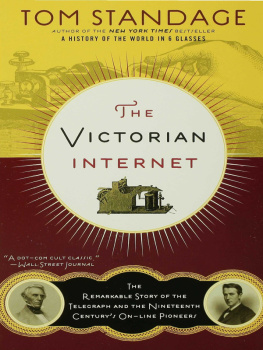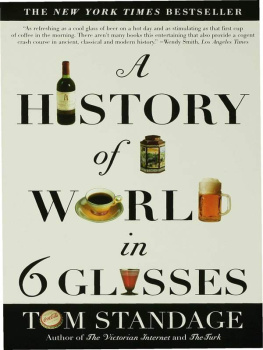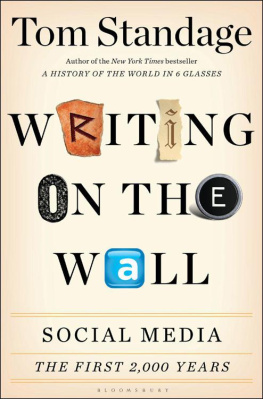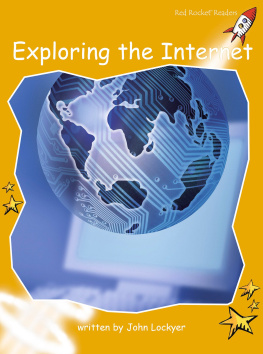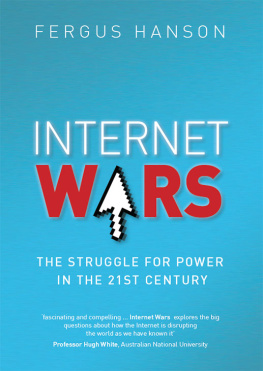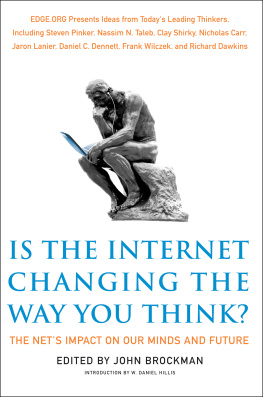"With every new technology, we overestimate how quickly people change their behavior. This dot-com cult classic compares Web fever to the awe of the telegraph."WallStreet Journal
"A fascinating walk through a pivotal period in human history."USA Today
"A new technology will connect everyone! It's making investors rich! It's the Internet boomexcept Samuel Morse is there!"Fortune
"[The telegraph's] capacity to convey large amounts of information over vast distances with unprecedented dispatch was an irresistible force, causing what can only be called a global revolution."Washington Post
"Richly detailed and immensely entertaining... Standage's writing is colorful, smooth and wonderfully engaging... a delightful book."Smithsonian Magazine
"One of the most fascinating books of the dot-com era." Financial Times
"An entertaining primer on a complex subject of increasing interest."Los Angeles Times Sunday Book Review
"Standage tells his fascinating story in an engaging, readable style, from the moment a bunch of Carthusian monks get suckered into a hilarious human electrical-conductivity experiment in 1746 to the telegraph's eventual eclipse by the telephone. If you've ever hankered for a perspective on media Net hype, this book is for you." -Wired
"Standage has written a lively book on the telegraph and its roles in helping 19th century business and technology grow... The Victorian Internet demonstrates engagingly that not even 31st century technology is totally new." Denver Post
"This book should be essential reading for those caught up in our own information revolution."Christian ScienceMonitor
"Standage's story is rich with anecdotes, bustling with a cast of idealists and eccentrics."BookPage
"An admirably efficient and concise telling of the story of the rise and decline of the telegraph. As with all good case histories, this one excites the mind with parallels to present-day experience."Henry Petroski, author of ThePencil: A History of Design and Circumstance
"[The Victorian Internet] is well worth reading, not only for the fascinating story it offers of early successes in global communication but also for the personal stories it relates. An extraordinary book! "Vinton Cerf, co-inventor of the Internet
"An inspired and utterly topical rediscovery of the emergence of the earliest modern communications technology."William Gibson, author of All Tomorrow'sParties
"A lively, short history of the development and rapid growth a century and a half ago of the first electronic network, the telegraph, Standage's book debut is also a cautionary tale in how new technologies inspire unrealistic hopes for universal understanding and peace, and then are themselves blamed when those hopes are disappointed." Publishers Weekly
"A fascinating overview of a once world-shaking invention and its impact on society. Recommended to fans of scientific history."Kirkus Reviews
"This lively, anecdote-filled history reveals that the telegraph changed the world foreverfrom a hand-carried-message world to an instantaneous one... Standage has it all here, including the role the telegraph played in war (Crimea), spying (the Dreyfus affair, in which Captain Dreyfus was first betrayed and then saved by a telegram), and even love (sort of the first chat rooms, to use an Internet term)." Booklist
THE VICTORIAN INTERNET
THE VICTORIAN
INTERNET
The Remarkable
Story of the
Telegraph and
the Nineteenth
Century's
On-line Pioneers
TOM
STANDAGE

Copyright 1998 by Tom Standage
Afterword copyright 2007 by Tom Standage
All rights reserved. No part of this book may be used or reproduced in any manner whatsoever without written permission from the publisher except in the case of brief quotations embodied in critical articles or reviews. For information address Walker & Company, 104 Fifth Avenue, New York, New York 10011.
Illustrations appear courtesy of the Cable & Wireless Archive, London. Illustrations used by permission of Warwick Leadlay Gallery, Greenwich, London. Illustrations used by permission of the Science and Society Picture Library, London. Illustrations used by permission of Culver Pictures.
Every reasonable effort has been made to trace the holders of material reproduced in this book, but if any have been inadvertently overlooked the publishers would be glad to hear from them.
Published by Walker Publishing Company, Inc., New York Distributed to the trade by Holtzbrinck Publishers
All papers used by Walker & Company are natural, recyclable products made from wood grown in well-managed forests. The manufacturing processes conform to the environmental regulations of the country of origin.
THE LIBRARY OF CONGRESS HAS CATALOGED THE HARDCOVER EDITION AS FOLLOWS:
Standage, Tom.
The Victorian Internet: the remarkable story of the telegraph and the nineteenth century's on-line pioneers/Tom Standage.
p. cm.
Includes bibliographical references and index.
1. TelegraphHistory. I. Title.
HE7631.S677 1998
384.i'o9dc21 98-24959
CIP
First published in the United States by Walker & Company in 1998
This paperback edition published 2007
eISBN: 978-0-802-71879-2
Visit Walker & Company's Web site at www.walkerbooks.com
1 3 5 7 9 10 8 6 4 2
Typeset by Coghill Composition Company
Printed in the United States of America by Quebecor World Fairfield
ToDr.K
CONTENTS
I N THE NINETEENTH CENTURY there were no televisions, airplanes, computers, or spacecraft; nor were there antibiotics, credit cards, microwave ovens, compact discs, or mobile phones.
There was, however, an Internet.
During Queen Victoria's reign, a new communications technology was developed that allowed people to communicate almost instantly across great distances, in effect shrinking the world faster and further than ever before. A worldwide communications network whose cables spanned continents and oceans, it revolutionized business practice, gave rise to new forms of crime, and inundated its users with a deluge of information. Romances blossomed over the wires. Secret codes were devised by some users and cracked by others. The benefits of the network were relentlessly hyped by its advocates and dismissed by the skeptics. Governments and regulators tried and failed to control the new medium. Attitudes toward everything from news gathering to diplomacy had to be completely rethought. Meanwhile, out on the wires, a technological subculture with its own customs and vocabulary was establishing itself.
Does all this sound familiar?
Today the Internet is often described as an information superhighway; its nineteenth-century precursor, the electric telegraph, was dubbed the "highway of thought." Modern computers exchange bits and bytes along network cables-, telegraph messages were spelled out in the dots and dashes of Morse code and sent along wires by human operators. The equipment may have been different, but the telegraph's impact on the lives of its users was strikingly similar.
The telegraph unleashed the greatest revolution in communications since the development of the printing press. Modern Internet users are in many ways the heirs of the telegraphic tradition, which means that today we are in a unique position to understand the telegraph. And the telegraph, in turn, can give us a fascinating perspective on the challenges, opportunities, and pitfalls of the Internet.
Next page
